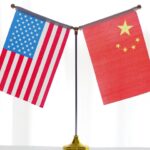A senior executive of Huawei announced on Saturday that its self-developed operating system HarmonyOS, a key for it to blunt the attack from the US chip and software ban, has already “achieved success”, and its ecosystem is also seeing dynamic, rapid growth after three years since its first launch in 2019.
“Over the past three years, millions of system developers and ecology partners have working together with us, riding the wind and waves,” Huawei executive board member Richard Yu Chengdong said on his Weibo account, China’s Twitter-like social media on Saturday.
“Now we’ve not only garnered 150 million devices using the OS, but also built a dynamic, fast growing Harmony ecosystem,” Yu said. “HarmonyOS, we made it!”
The Chinese telecommunications giant is currently holding its annual biggest event, the Huawei Developer Conference (HDC) in Dongguan city, South China’s Guangdong Province. During the event, the firm invited developers, industry heavyweights and partners to experience and share the latest technology it has developed over the past year.
HarmonyOS is in no doubt at the center of the focus at the event.
In the latest progress, both the HarmonyOS and the Huawei Mobile Services (HMS), its own solution based on HarmonyOS after being banned from using Google Mobile Services, has ushered in an upgrade, several executives of the firm announced at the HDC event. The firm has launched the updated HarmonyOS-3 developer preview version, and also released the HMS Core-6 system.
To put it in simple, HarmonyOS can be used as the operating system of devices from mobile phones, tablets, to watches, and HMS will cooperate and support the operating system to help various applications run better on the operating system, industry analysts said, noting that they are now the two foundations for Huawei to building up its own ecosystem.
HarmonyOS was unveiled in 2019 as a “back-up” for Google’s Android operating system when the Chinese company was barred from using Google’s services under a relentless US government export ban. Research on the OS actually began in 2012.
“The operating system is indeed developing very fast, but it might be too early to say it’s a success at current stage, and I prefer to call it a phased success,” an industry player, who asked to be anonymous, told the Global Times on Saturday during the sideline of the HDC.
The person noted that ecological system construction is a protracted battle, which requires continuous investment and accumulation, and Huawei still need time before it could rival Google’s Android and Apple’s iOS.
So far, devices updated to Huawei’s HarmonyOS, including smartphones, watches and tablets, have already surpassed 150 million, making it the fastest-growing smart OS ever, Yu said during a keynote speech at the HDC on Friday. Yu added that the number could surpass 200 million by the end of the year.
Investment in HarmonyOS and HMS systems has now exceeded 50 billion yuan, the firm unveiled during the HDC, indicating it will ratchet up software investment in the following years.
Global Times



